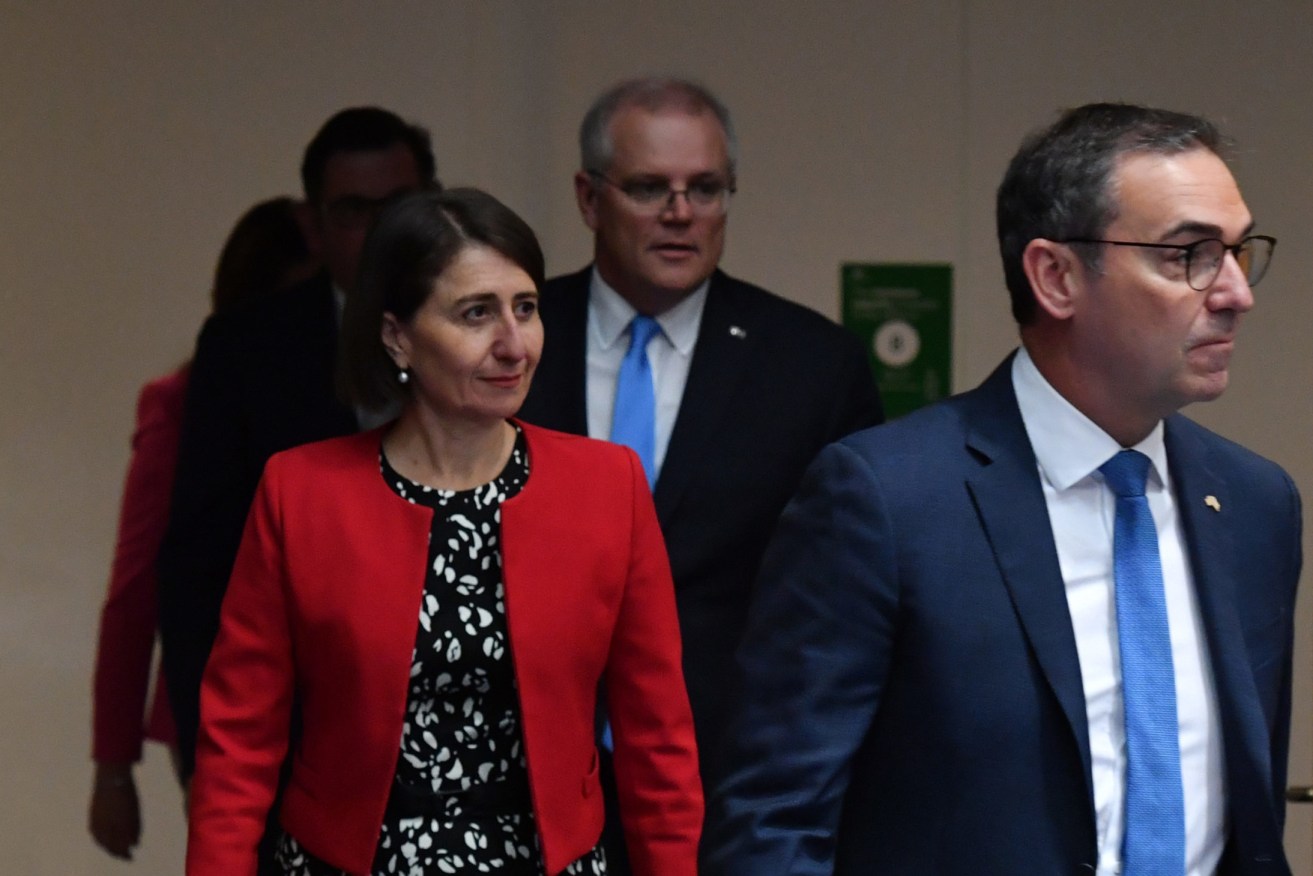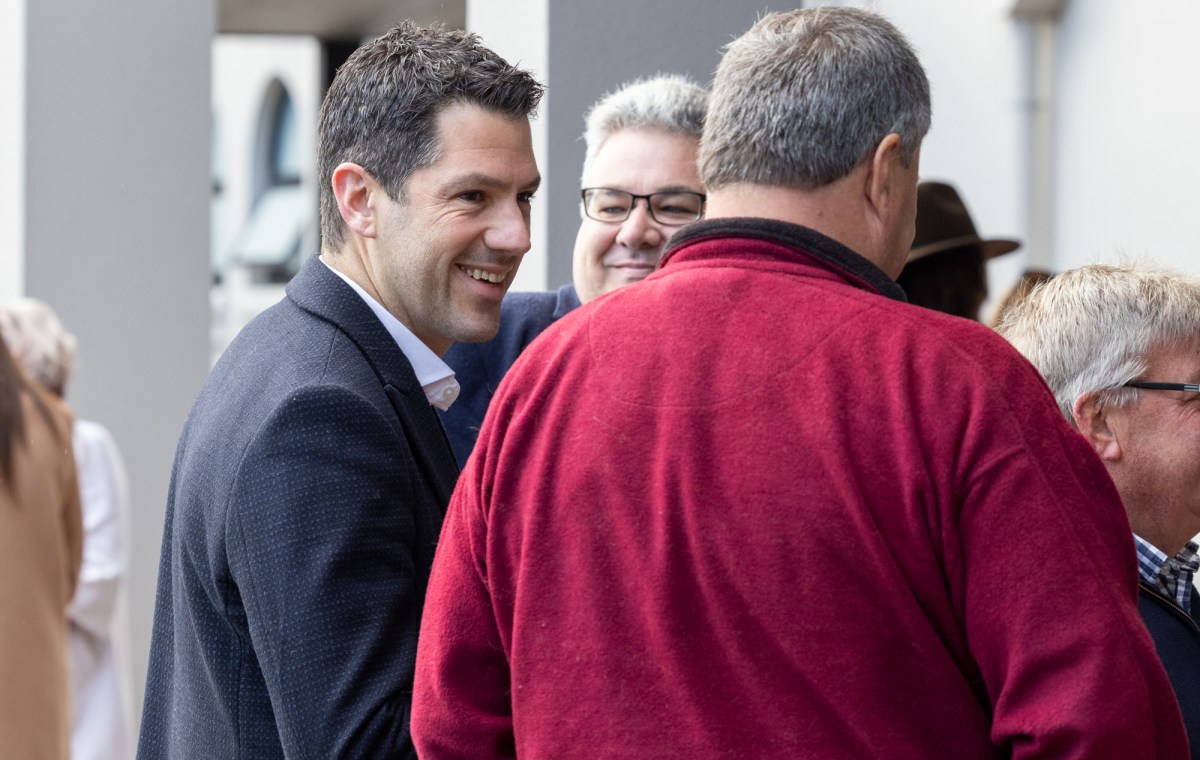Richardson: Sgt Schultz and SA’s Right snowflakes set for showdown
A state Liberal showdown looms tomorrow, as a tense political battle wages in the backdrop of Steven Marshall’s statesmanlike turn as MC of the state’s COVID-19 response, writes Tom Richardson.

Steven Marshall leads Gladys Berejiklian and Scott Morrison into a media conference after national cabinet met last year. Photo: Mick Tsikas / AAP
One political legacy of the COVID era has been to elevate state premiers into national figures, in a way they have rarely – if ever – been before.
Even by this metric, though, Steven Marshall has remained a low-key player.
He’s like Billy Zane playing one of Biff Tannen’s sidekicks in Back To The Future: once in a while you’ll notice him and think to yourself ‘ah yeah, that’s right – he’s in this too’, but in general he’s not a significant part of the narrative.
That’s largely because he’s stuck to his pre-election mantra of not picking ‘fake fights’ – with Canberra, specifically, but he’s been loath to rock the boat with other state leaders either.
Moreover, the state he leads has largely breezed through the pandemic thus far, with only two brief hard lockdowns imposed since mid-2020 – one of which didn’t even last the distance.
That’s made it less starkly obvious that he’s one of the few state premiers to be firmly behind Scott Morrison and his national plan.
While Berejiklian, Andrews, Palaszczuk and McGowan have all variously locked horns with the PM or his offsiders over COVID management tensions, Marshall has publicly committed to the notion that statewide lockdowns will be a thing of the past once we reach a threshold of 80 per cent of the adult population fully vaccinated.
The WA premier, by contrast, isn’t buying it at all.
He called the proposal – which we were told weeks ago was agreed to by the national cabinet – “madness”, arguing that “by knowingly letting the virus in, it would mean we’d have hundreds of people die, have to wind back our local freedoms, introduce restrictions and shut down large parts of our economy”.
However statesmanlike Marshall’s unimposing acquiescence has been, there’s no doubt fellow premiers have reaped significant political capital from picking fights with the feds – fake or otherwise.
There appears to be a sizeable chunk of the population nationally who would happily reside in Fortress Australia for the rest of their natural lives – as long as they could be reasonably sure their lives will end naturally.
Marshall’s premiership has been an interesting one; like Jay Weatherill before him, his term has been defined by an event neither expected nor planned for.
In the Labor predecessor’s case it was a statewide blackout, which became the focal point of national debate over renewable energy, elevating Weatherill to the national stage, and giving him the ironic impetus to campaign on energy security, punctuated by the brief arrival of Elon Musk to announce his ‘big battery’ project.
For Marshall, the pandemic has given him focus and clout that he was beginning to lack.
After a largely squandered 2019, the State Government was forced to clear the proverbial decks once COVID hit: commitments to a balanced budget, squabbles over land tax, health system razor gangs… it all faded into obscurity as the state was instead bewitched by daily coronavirus updates.
What appeared a masterstroke early on – vesting the power (and with it, the responsibility) for all decisions with chief public health officer Nicola Spurrier and police commissioner Grant Stevens – has also meant that Marshall is more like a master of ceremonies at these regular events.
Questions on detail are inevitably handballed to one or other of his two public servants.
But then, he’s also loath to buy in to unrelated questions of realpolitik.
After all, you can’t come across statesmanlike and behave like a politician at the same time.
Those questions then, are generally brushed away with the now-familiar rejoinder: “I haven’t been briefed about that.”
Marshall has been particularly keen to avoid being dragged into the squabbles besetting his own party.
A long-simmering factional brawl exploded this year when InDaily reported on a Right-faction ‘recruitment drive’ targeting largely-Pentecostal Christian communities.
That revelation was accompanied by footage of one of Marshall’s senior frontbenchers – Environment Minister David Speirs – telling one Adelaide congregation that churches “have to be engaged” in politics, and advising them to “pay very close attention to what’s happening in your parliament and what your local members of parliament are doing”.
“This idea of the separation of church and state – forget it,” said Speirs to Southland parishioners in Pasadena.
“If you’re going to use that as an excuse – and many churches do – not to get involved, and not to influence your members of parliament, we are on a sad and slippery slope to a very dangerous place.”
He also heaped scorn on parliament’s Legislative Councillors – of which nine of the current 22 are Liberal colleagues – saying: “I don’t really know what they do, to be honest.”
“They just wave legislation through, they shrug their shoulders and they’re not interested in undertaking deep analysis or challenging legislation… it’s such a laissez faire, Left-leaning place – it’s extremely concerning.”
When InDaily asked Marshall about Speirs’ remarks some days later, he said he hadn’t “seen those exact comments”, adding a few general points about the separation of church and state being important but that church members were welcome to join political parties.
Of course, those same church members weren’t made to feel particularly welcome when his own party later opted to freeze their membership applications and audit them instead.
Still, it shows a keen commitment to what generations older than mine might know as the ‘Sergeant Schultz defence’.

Personally, if I were leading a government and one of my ministers was publicly espousing such views, I’d probably want to know a bit about it. But that’s just me.
Regardless, the success of the Evangelical membership surge will be tested tomorrow, when the state Liberal Party meets for its keenly-awaited AGM.
The Right faction will be hoping – though not expecting – to snare a majority on the party’s ruling state executive, although the fact the conservatives couldn’t convince one of their own to run against moderate-backed incumbent Legh Davis for the party presidency doesn’t bode well.
It means the Right will need a clean sweep of the vice-presidential positions to swing a majority.
Still, they will gain some ground – and with the recruitment drive continuing apace, they can expect to keep pushing for broader control of the party over the next year.
That would see the faction wrest control of state council before the ensuing round of preselections – including deciding the party’s next senate ticket, on which first-term SA senator Alex Antic will be seeking prominent billing.

Alex Antic and friends at a recent Liberal state council meeting. Photo: Tony Lewis / InDaily
Antic has emerged as an architect of the Pentecostal insurgence – not that he’s said as much to InDaily, which he regularly brands “fake news” but otherwise refuses to engage with.
This, he has said, is “due to your inaccurate and lop-sided reporting”, adding with a Trump-like flourish: “I do not speak with InDaily because InDaily is fake news.”
Alex, of course, prefers to engage with more balanced and objective news outlets.
Such as this, for instance:
If that seems confusing, you’ll note that in the above excerpt he rails against “any policy position that drifts into the realm of identity politics”, arguing: “I don’t know why state parliaments all across the country – but particularly in SA – are dealing with social issues when they should be talking about economic issues.”
Alex, mind you, rarely seems to talk about economic issues.
His most recent contributions to federal parliament debate have included topics such as conservatism, identity politics, SA’s voluntary assisted dying Bill and his own Liberal Party recruitment drive, while his Facebook page regularly rails against all things ‘woke’, defending core Australian rights such as devouring Golden Gaytimes and criticising ongoing media reporting of Taylor Walker’s racism ban.
“No apology or sanction is enough to satisfy the activist media and their friends in the radical left,” he wrote recently on that topic.
“They do not stop until they completely destroy their target.
“The truth is that it’s only a matter of time before they come for you and your family.
“Everyone has a role to play. What are you doing about it?”
Much of this stuff appears a deliberate rallying cry to those very people he’s endeavouring to recruit.
As he told the Senate back in February: “Conservatives need to fight back.”
“They need to become loud and they need to get more involved in the machinery of politics,” he said at the time, in a speech that – in hindsight – fired the starter’s pistol on the ‘Believe in Blue’ recruitment frenzy.
“Common sense, decency and values need you; they need your family and they need your friends. They need you to be heard before the mob cancels you and cancels your way of life.”
Antic did, in fact, engage with InDaily for a brief while there, but stopped – along with several of his Right-aligned fellow travellers – when we first reported the factional split that was later formalised with the formation of a loosely-aligned Centre Right, an event that ultimately saw the conservatives lose control of state executive in the first place.
A favourite pejorative of the political Right in recent years has been ‘snowflake’ – a term to deride those judged too easily offended and unable to deal with opposing opinions.
Far be it from me to suggest the term could apply closer to home, but here at the Fake News Media we’re always happy to see frosty relationships thaw.
At any rate, the weekend will be a defining one for Antic and his burgeoning army of recruits.
But it could also be defining for Marshall.
While he’s eschewed the nasty business of politics in his role as COVID-MC-in-chief, an all-out factional war would become increasingly difficult to sweep under the carpet.
If Marshall isn’t interested in copying the ‘fights with the feds’ template of Mark McGowan in WA, he could yet heed the political lesson of that state’s Liberal counterparts – effectively abolished as an electoral force, as a similar Hard Right takeover helped feed the narrative that they were not merely ungovernable but unfit to govern.
We’re nowhere near that point yet in SA – but you don’t need a particularly long memory to know the state Liberals have been here before.
In the 53 years between the end of the Playford era and Marshall’s election win, his party was in government for just 14 of them – about the worst record of any political movement in the country.
Marshall could well win re-election on the back of SA’s enviable COVID management record – but a failure to cauterise the wounds left by the ongoing fight for the soul of the Liberal movement could yet leave a lasting, and unwanted, legacy.
Tom Richardson is a senior reporter at InDaily.




